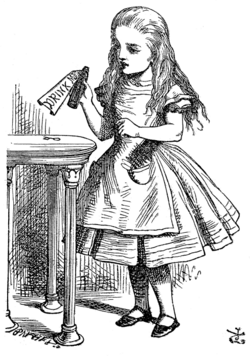 Alice's Adventures in Wonderland , illustrated by John Tenniel, is an inspiration for the popularity of the name Alice. | |
| Pronunciation | /ˈælɪs/ German: [aˈliːsə] French: [alis] Italian: [aˈliːtʃe] |
|---|---|
| Gender | Feminine |
| Language | English, German, French, Italian |
| Origin | |
| Language | Old French |
| Meaning | 'nobility' |
| Other names | |
| Variant forms | Alaïs, Alicia, Alisha, Alisa, Alissa, Alix, Aliz, Alíz, Alyce, Alys |
| Related names | Adalheidis, Adalheide, Adelheide, Alitha, Alita, Zélie |
| [1] | |
Alice is a feminine first name with roots in the French and German languages.